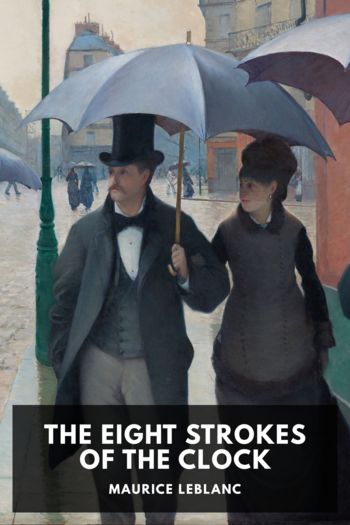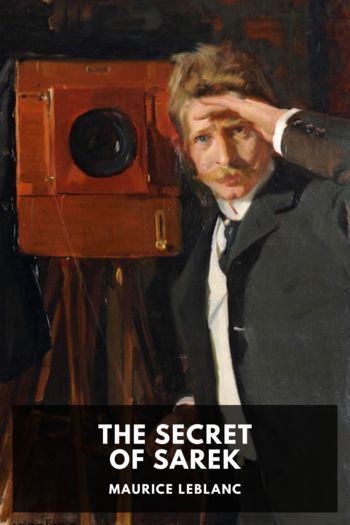The Eight Strokes of the Clock - Maurice Leblanc (reading in the dark .TXT) 📗

- Author: Maurice Leblanc
Book online «The Eight Strokes of the Clock - Maurice Leblanc (reading in the dark .TXT) 📗». Author Maurice Leblanc
“Yes. M. Guillaume had entered the sixty numbers in his pocketbook.”
Rénine muttered, a moment later:
“That’s where the whole problem lies. Where are the notes? If we could lay our hands on them, we should know everything.”
At the Brasserie Lutetia there was a telephone in the private room where he asked to have lunch served. When the waiter had left him alone with Hortense and Dutreuil, he took down the receiver with a resolute air:
“Hullo! … Prefecture of police, please. … Hullo! Hullo! … Is that the Prefecture of police? Please put me on to the criminal investigation department. I have a very important communication to make. You can say it’s Prince Rénine.”
Holding the receiver in his hand, he turned to Gaston Dutreuil:
“I can ask someone to come here, I suppose? We shall be quite undisturbed?”
“Quite.”
He listened again:
“The secretary to the head of the criminal investigation department? Oh, excellent! Mr. Secretary, I have on several occasions been in communication with M. Dudouis and have given him information which has been of great use to him. He is sure to remember Prince Rénine. I may be able today to show him where the sixty thousand-franc notes are hidden which Aubrieux the murderer stole from his cousin. If he’s interested in the proposal, beg him to send an inspector to the Brasserie Lutetia, Place des Ternes. I shall be there with a lady and M. Dutreuil, Aubrieux’s friend. Good day, Mr. Secretary.”
When Rénine hung up the instrument, he saw the amazed faces of Hortense and of Gaston Dutreuil confronting him.
Hortense whispered:
“Then you know? You’ve discovered … ?”
“Nothing,” he said, laughing.
“Well?”
“Well, I’m acting as though I knew. It’s not a bad method. Let’s have some lunch, shall we?”
The clock marked a quarter to one.
“The man from the prefecture will be here,” he said, “in twenty minutes at latest.”
“And if no one comes?” Hortense objected.
“That would surprise me. Of course, if I had sent a message to M. Dudouis saying, ‘Aubrieux is innocent,’ I should have failed to make any impression. It’s not the least use, on the eve of an execution, to attempt to convince the gentry of the police or of the law that a man condemned to death is innocent. No. From henceforth Jacques Aubrieux belongs to the executioner. But the prospect of securing the sixty banknotes is a windfall worth taking a little trouble over. Just think: that was the weak point in the indictment, those sixty notes which they were unable to trace.”
“But, as you know nothing of their whereabouts. …”
“My dear girl—I hope you don’t mind my calling you so?—my dear girl, when a man can’t explain this or that physical phenomenon, he adopts some sort of theory which explains the various manifestations of the phenomenon and says that everything happened as though the theory were correct. That’s what I am doing.”
“That amounts to saying that you are going upon a supposition?”
Rénine did not reply. Not until some time later, when lunch was over, did he say:
“Obviously I am going upon a supposition. If I had several days before me, I should take the trouble of first verifying my theory, which is based upon intuition quite as much as upon a few scattered facts. But I have only two hours; and I am embarking on the unknown path as though I were certain that it would lead me to the truth.”
“And suppose you are wrong?”
“I have no choice. Besides, it is too late. There’s a knock. Oh, one word more! Whatever I may say, don’t contradict me. Nor you, M. Dutreuil.”
He opened the door. A thin man, with a red imperial, entered:
“Prince Rénine?”
“Yes, sir. You, of course, are from M. Dudouis?”
“Yes.”
And the newcomer gave his name:
“Chief-inspector Morisseau.”
“I am obliged to you for coming so promptly, Mr. Chief-inspector,” said Prince Rénine, “and I hope that M. Dudouis will not regret having placed you at my disposal.”
“At your entire disposal, in addition to two inspectors whom I have left in the square outside and who have been in the case, with me, from the first.”
“I shall not detain you for any length of time,” said Rénine, “and I will not even ask you to sit down. We have only a few minutes in which to settle everything. You know what it’s all about?”
“The sixty thousand-franc notes stolen from M. Guillaume. I have the numbers here.”
Rénine ran his eyes down the slip of paper which the chief-inspector handed him and said:
“That’s right. The two lists agree.”
Inspector Morisseau seemed greatly excited:
“The chief attaches the greatest importance to your discovery. So you will be able to show me? …”
Rénine was silent for a moment and then declared:
“Mr. Chief-inspector, a personal investigation—and a most exhaustive investigation it was, as I will explain to you presently—has revealed the fact that, on his return from Suresnes, the murderer, after replacing the motorcycle in the shed in the Avenue du Roule, ran to the Ternes and entered this house.”
“This house?”
“Yes.”
“But what did he come here for?”
“To hide the proceeds of his theft, the sixty banknotes.”
“How do you mean? Where?”
“In a flat of which he had the key, on the fifth floor.”
Gaston Dutreuil exclaimed, in amazement:
“But there’s only one flat on the fifth floor and that’s the one I live in!”
“Exactly; and, as you were at the cinema with Madame Aubrieux and her mother, advantage was taken of your absence. …”
“Impossible! No one has the key except myself.”
“One can get in without a key.”
“But I have seen no marks of any kind.”
Morisseau intervened:
“Come, let us understand one another. You say the banknotes were hidden in M. Dutreuil’s flat?”
“Yes.”
“Then, as Jacques Aubrieux was arrested the next morning, the notes ought to be there still?”
“That’s my opinion.”
Gaston Dutreuil could not help laughing:
“But that’s absurd! I should have found them!”
“Did you look for them?”
“No. But I should have come across them at any moment. The place isn’t big enough to swing a cat in. Would you care to see it?”
“However small it may be, it’s large enough to hold sixty bits of paper.”
“Of course, everything





Comments (0)